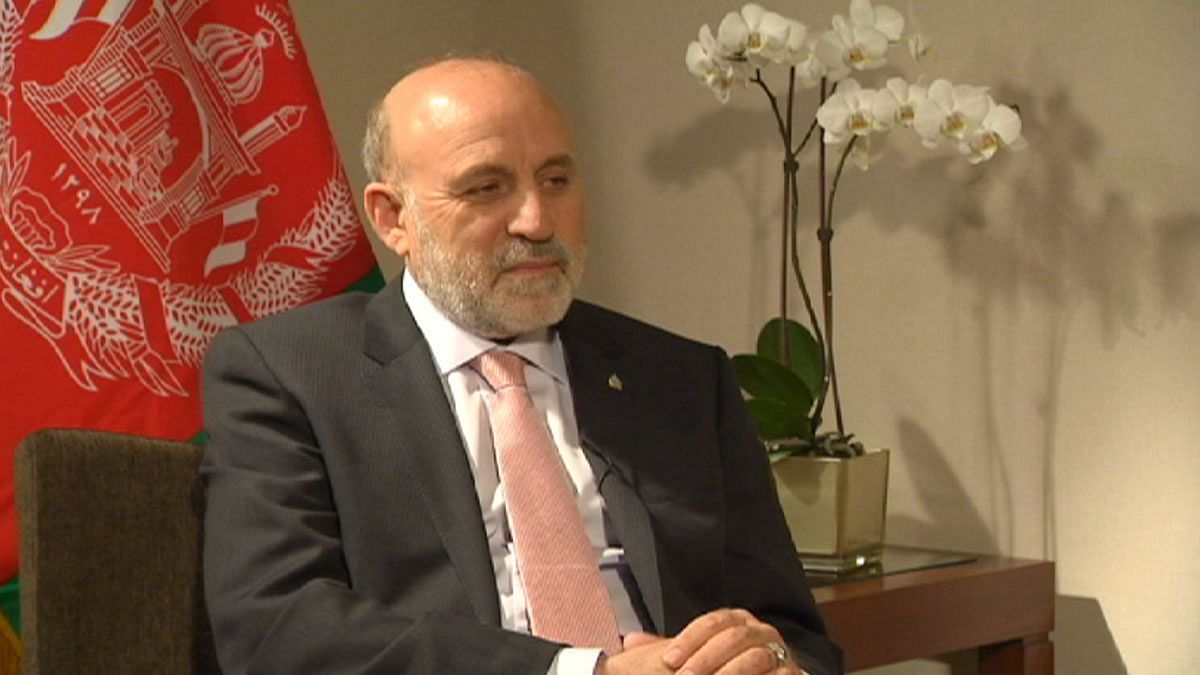In the first round of Afghanistan’s presidential elections (held on April 6), Afghans went to the polls in defiance of threats from the Taliban to disrupt the run-off vote on Saturday 14 June. We discussed this with Interior Minister Mohammed Omar Daudzai.
Maria Sarsalari, euronews: “The first round of the elections was successful, largely due to the Interior Ministry’s performance in providing security. Do you expect the second round to be equally successful in this sense? Have measures been taken to improve the election process?”
Mohammed Omar Daudzai: “In the name of God, the first round of the elections was a great victory for all the people of Afghanistan and, particularly, for the Afghan forces who heroically provided security for the election. It was also an international victory. The election sent a message to the international community that 12 years of their efforts has not gone to waste. The experience of the first round will help us, we hope, to hold the second round in a secure, good atmosphere.”
euronews: “There was talk about setting up new voting stations so that some of the problems of the first round wouldn’t happen again. Has that been done?”
Daudzai: “Well, according to Afghanistan’s Election Commission, the number of sites remains the same but more voting booths have been provided. The security arrangements will not be much different, but we will have more police officers manning the entrances of the voting stations to ensure security.”
euronews: “Can you tell us about any progress being made in training for the national police force?”
Daudzai: “In order to return to its main duty – which is to uncover and fight crime and focus on law enforcement – our police force needs training. This is going very well in Afghanistan and abroad. At home, we have one police academy. We have police training centres in the provinces and we have a staff college. In Kabul, we have the security command training centre, and soon we’ll open the first police academy for women, in Bamian province with help from Europol.”
euronews: “Concerning the recruiting of thousands of women police officers to help keep the elections safe, is there a clear vision and a public will to increase the presence of women or is this idea limited to the Interior Ministry?”
Daudzai: “One of my top priorities in the past eight months [since taking on this post] has been to increase the number of women in the ministry at various levels. For example, for the first time, the commander of Kabul police District Number One is a woman. The Deputy Commander of security at Kabul Airport is a woman. In the same way, we have plans to increase the number of women at all the different levels of the ministry.”
euronews: “On the eastern border, where rocket attacks from Pakistan into Afghanistan continue, particularly in Konar province, the Afghan authorities have spoken out strongly against this. What is going on?”
Daudzai: “Well, one reason for these attacks could be that the Trilateral Talks between Afghanistan, Pakistan and NATO will end this year. The Pakistanis want to replace it with a bilateral process. It is possible that the attacks are aimed at putting pressure on Afghanistan, to gain leverage at the negotiating table, but it is counterproductive. We do not want any sort of tension. We want to live in peace and reconciliation with our neighbours and we expect them to treat us with the same good will.”
euronews: “Why has Afghanistan delayed the signing of the security pact with the United States?”
Daudzai: “Because the United States could not put enough pressure on Pakistan to bring the leaders of the Taliban to the negotiation table. So Afghanistan’s president said, ‘Well, okay, let the next president sign it’. But as the election has come closer, both candidates have promised that if they become president, they will sign it in the first week of coming to office. I am sure that the United States and the West and Europeans will not have to worry about this any more.”
euronews: “According to Wikileaks, US intelligence has been listening in on all the phone conversations of Afghan citizens. The Afghan government has reacted negatively. Have you had an official response from American officials?”
Daudzai: “The Americans will certainly have something to say about it, and will shed some light on it, but the people of Afghanistan were disappointed that all their phone conversations might have been monitored. This is against the Afghan constitution.”
euronews: “There is international concern that three quarters of the world’s opium comes from Afghanistan. What has been done to replace this commerce, which has become a global trade. Is there any hope?”
Daudzai: “It is a major source of suffering for the people of Afghanistan that we are cultivator of the opium poppy. Terrorism and opium feed off each other. The profits enrich the Taliban. This provides wealth for terrorism. We believe that when peace comes to Afghanistan, this problem will also be solved — when nationwide and lasting peace prevails.”
